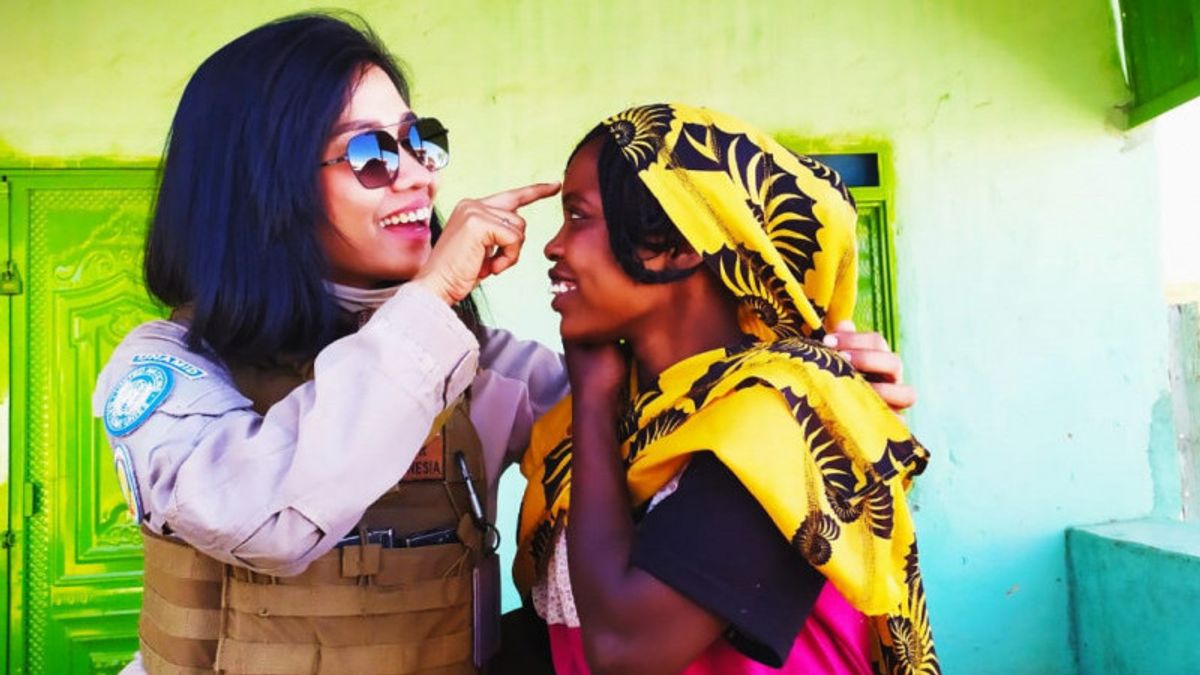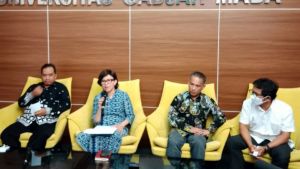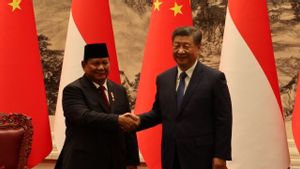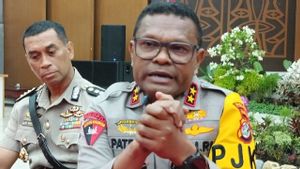BANJARMASIN - The figure of a female police officer (polwan) is often seen by the public as "decoration" in the National Police. Their nature as women cannot be separated from household matters, so it is perceived that the burden of assignment in the National Police is not as heavy as that of male police officers (polki).
Even so, not a few of the policewomen who actually appear at the forefront of breaking the boundaries show their best abilities to make proud achievements.
Brigadier Astri Theresia for example. This strong policewoman at the South Kalimantan Police has succeeded in making history in the UNAMID (United Nations and African Union Mission in Darfur) mission in Sudan.
Joined in the Garuda Bhayangkara Task Force (Garbha) II Formed Police Unit (FPU) 11 Indonesia, he was one of 140 Polri personnel who were sent to the conflict country in North Africa for one year and six months starting from March 9, 2019 to September 26. 2020.
Theresia is not alone, as many as 15 policewomen from various Polda joined the Indonesian FPU 11 Task Force.
Specifically, the South Kalimantan Police sent four personnel, 3 Polki and 1 Policewoman, namely Bripka Astri Theresia, Bripka Hidayattulah, Brigadier I Wayan SP Mahardika and Brigadier Moh. Modassir.
Running a world peacekeeping mission under the international organization of the United Nations (UN) in Darfur, Sudan, was a valuable experience for Tere, as Astri Theresia is usually called.
For him, serving abroad is a dream come true. Despite all the challenges and obstacles that must be passed so hard, especially temporarily separated from family.
Since 2008 in the new FPU format, FPU 11 Indonesia has become the first Indonesian FPU to send policewomen to the Darfur mission area, Sudan, in 2019.
A total of 15 policewomen at FPU 11 Indonesia also succeeded in making achievements in the mission area, especially in humanitarian missions and cultural missions.
Many appreciations from UNAMID officials and local communities in the mission area have made policewomen as one of the center points for the implementation of peacekeeping missions.
According to Tere, the attitude and way of acting from the women's point of view certainly makes the implementation of tasks in the field different. Gentleness and speech helped smooth the task, especially when dealing with women and children in the mission area.

Allotted once every four days to contact family
Tere joined the contingent serving in the Golo area, Central Jabbal Marra, Darfur. A residential and rural district located in Central Darfur, about 250 km from El Fasher, the capital of North Darfur, Sudan.
Golo TOB (Temporary Operating Base) is located in the Jabbal Marra mountains and is the center of the Jabbal Marra Task Force (JMTF) which is located at an altitude of about 1,632 meters above sea level. The weather will be very cold in the evening until the morning, around 16 to 19 degrees celsius.
Tere likens the condition of Golo to that of Indonesia in 1930. There is no signal and it is very lagging behind. Even motorized vehicles such as cars do not exist. Local people's transportation only relies on animals, namely donkeys and camels.
To be able to communicate with family in the country, Indonesian FPU 11 Task Force personnel use the UN's wifi signal which is allotted every four days.
"The duration is only about two to three hours. But if there is a disturbance, then queue again for the next four days," said the 28 year 2003 policewoman.
The policewoman, who was born in Banjarbaru on January 19, 1985, admits that her longing for family becomes the heaviest burden she feels when she has to be so far apart.
Moreover, his three children, Abelardo (13), Alesandro (11) and the youngest Audrey (9) always ask when their mother is coming home.
Even so, his son and husband Aiptu Julpensius Purba actually gave him an injection of encouragement to be able to focus on carrying out his duties without having to be burdened with other thoughts except to achieve success in ending the patriotic Garuda and red and white mission as the identity of the troops from Indonesia.
Tere said there was no difference between polki and policewomen while on duty in Sudan. Implementation of the operational tasks of FPU 11 Indonesia, including patrols to the refugee camp area. In addition to providing protection for Police Advisor personnel, FPU troops also approach and interact with the community.
Then escorting delegates who came to visit UNAMID for certain purposes for humanity, including escorting the distribution of humanitarian aid from WFP, UNICEF, or the International Non Government Organization (I-NGO).
In principle, Indonesian FPU 11 personnel provide security for people who carry out daily activities from parties who try to undermine security stability.
To get to know the cultural diversity that Indonesia has, Tere and other personnel also often present arts and culture at every opportunity for major events or events, both UN activities or commemorating Indonesian holidays.
"We perform various kinds of regional dances such as Tor-tor, Uwok Batung, Maumera, Marawis, Kecak, Cakalele and Metikei," said the policewoman who is now serving in the Human Resources Bureau (SDM) of the South Kalimantan Police.
The pandemic hinders troop rotation
The COVID-19 pandemic has become an obstacle in the operational implementation and rotation of UNAMID's missions, so that all movements are restricted.
Including FPU 11, Indonesia experienced a rotation delay of up to 6 months. As a result, Tere and his fellow troops had to stay longer in Sudan than scheduled, which was only one year to 1 year and 6 months.
Even so, Tere was not necessarily sad because he had to delay his return to Indonesia which would automatically extend the time of "parting" with his family.
He believed that everything was God's plan. Humans can only plan but destiny is still the Creator who determines.
According to him, whatever happens in the field of duty is a consequence that must be lived with sincerity.
Moreover, joining the Garuda Bhayangkara Task Force with the noble task of carrying out a humanitarian mission has been his dream since he decided to take part in the selection. Besides, he likes challenges and hobbies.
It is not easy for a member of the Police, let alone a policewoman, to be elected. The super tight selection process is a challenge for every Bhayangkara person and only the best are given the opportunity to become the nation's ambassadors in the international arena.
In addition to excellent physical abilities, personnel are also required to master foreign languages, especially English. Especially for assignments in Sudan, a country with a Muslim population that is still in the Middle East region, Polri personnel are also equipped with Arabic language skills so they can communicate with the people there.
"After being selected, we were given training including learning Arabic at a multi-function training center in Cikeas, Bogor, West Java," said Tere, telling about his preparations before leaving for Sudan at that time.
Tere stated that not all Polri personnel can feel the special task of being sent abroad. For this reason, she as a policewoman is very grateful for what has been achieved.
"Police leaders provide equal opportunities for female policewomen to compete with police. Let's Srikandi in Bhayangkara show our best ability to serve without limits for the community, nation and state," said the alumnus of SMKN 5 Banjarmasin.
The existence of policewomen has been tested
The Coordinating Officer (Pakor) of Polwan Polwan South Kalimantan AKBP Siti Zubaidah said the existence of policewomen had been tested with all the proud achievements made.
Like the policewomen in Bumi Lambung Mangkurat, the nickname for the South Kalimantan area. The best Bhayangkara heroes keep popping up from time to time.
"We have First Brigadier Astri Theresia who is a member of the Garbha II FPU 11 Indonesia Task Force. Then First Brigadier Sheren Septiana attended two international standard trainings in the Philippines and the United States. Currently there are also female policewomen who are studying in England," he said.
Zubai emphasized that policewomen are not decorative figures in the Polri institution but are an important part for the successful implementation of Polri's duties to maintain a conducive kamtibmas.
Meanwhile, South Kalimantan Police Chief Inspector General Rikwanto hopes that he will turn 73 years old on September 1, 2021, policewomen will be better and have integrity to become the mainstay of the National Police in carrying out their duties.
According to him, the leadership of the National Police, now commanded by the National Police Chief General Listyo Sigit Prabowo, continues to provide opportunities for policewomen through the placement of tasks and strategic positions.
The English, Chinese, Japanese, Arabic, and French versions are automatically generated by the AI. So there may still be inaccuracies in translating, please always see Indonesian as our main language. (system supported by DigitalSiber.id)












